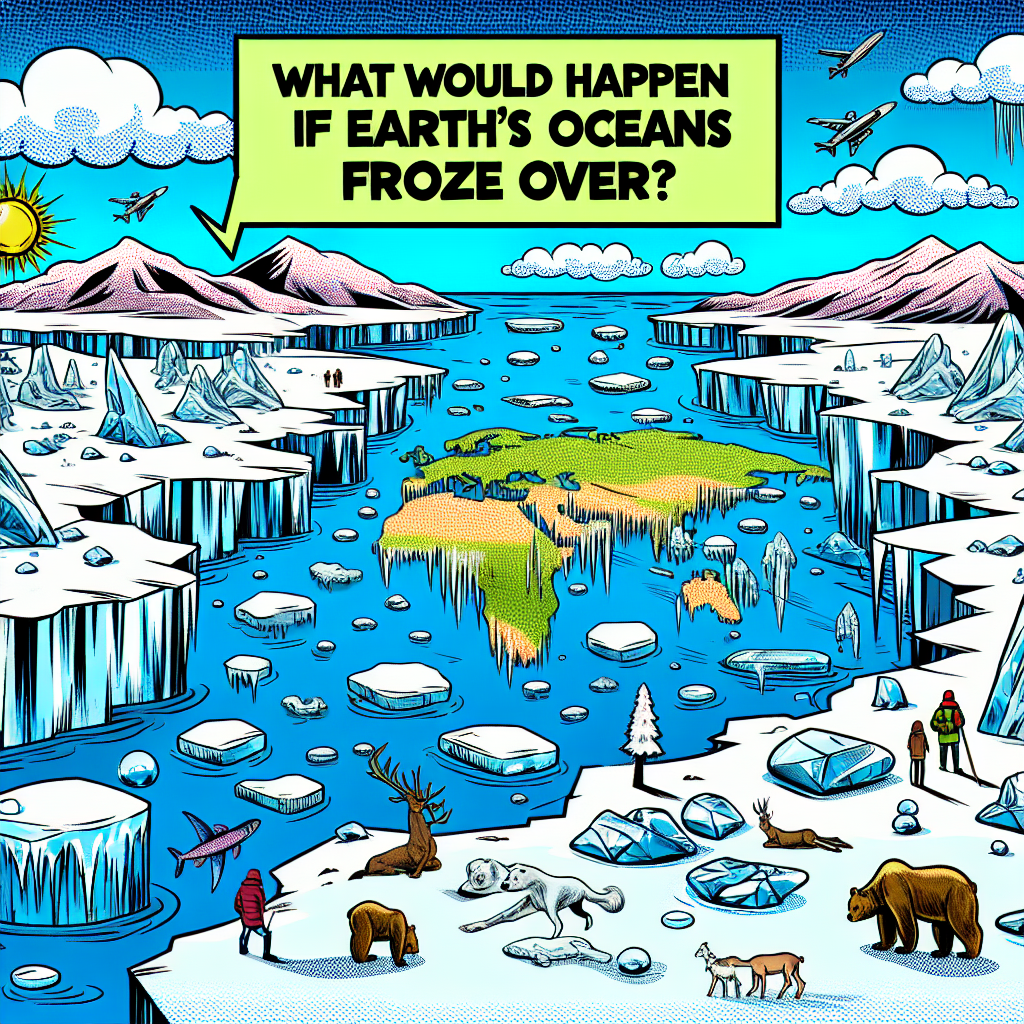Earth's oceans frozen over would be an unfathomable phenomenon, and I'd be happy to break down the implications.
First, let's consider the sheer scale of the task. The world's oceans hold approximately 1.3 billion cubic kilometers of water, which is roughly 97% of the planet's total water supply. Freezing that much water would require an enormous amount of energy removal from the system. Imagine a cosmic refrigerator, siphoning away the heat from our oceans at an unprecedented rate.
Now, if we were to assume that somehow, miraculously, all the oceans froze over, the consequences would be far-reaching. For starters, the Earth's albedo, or reflective capacity, would increase dramatically. The oceans, which currently absorb and distribute solar radiation, would suddenly become giant mirrors, reflecting sunlight back into space. This would have a profound impact on the planet's energy balance, potentially leading to a significant cooling of the atmosphere.
As the oceans froze, the hydrologic cycle would grind to a halt. There would be no evaporation, no precipitation, and no freshwater supply. The consequences for our planet's ecosystems would be catastrophic. Plants and animals alike rely on the continuous cycling of water between the oceans, atmosphere, and land. Without it, life as we know it would collapse.
The frozen oceans would also have a profound impact on global weather patterns. Ocean currents, which play a crucial role in distributing heat around the globe, would cease to function. This, in turn, would disrupt the atmospheric circulation patterns, leading to unpredictable and extreme weather events. Imagine a world where the Polar Jet Stream becomes the dominant force, causing chaotic weather fluctuations.
Another critical aspect to consider is the Earth's geology. With the oceans frozen, the added weight of the ice would cause the seafloor to depress, potentially leading to a resurgence of volcanic activity as the Earth's crust adjusts to the sudden change. This could result in massive earthquakes, tsunamis, and the creation of new landforms.
Let's not forget the human factor. With the oceans frozen, global trade and commerce would come to a standstill. No shipping, no fishing, and no access to the vast mineral resources hidden beneath the seafloor. Coastal cities would become ghost towns, abandoned as the frozen tundra creeps inland.
Furthermore, the frozen oceans would have a profound impact on the planet's carbon cycle. The oceans currently absorb approximately 25% of the carbon dioxide released into the atmosphere. With the oceans frozen, this critical carbon sink would be lost, leading to a rapid increase in atmospheric CO2 levels and, subsequently, accelerated global warming.
In terms of the planet's climate, the frozen oceans would create a perpetual ice age. The reflective ice would cool the atmosphere, leading to a self-reinforcing cycle of cooling and ice growth. This, in turn, would have a devastating impact on global biodiversity, as species adapted to the current climate would struggle to survive in the new, colder environment.
Now, let's examine the possibility of a frozen ocean's impact on the Earth's rotation and magnetic field. The redistribution of mass, with the weight of the ice concentrated at the poles, could potentially slow the Earth's rotation. This, in turn, could have a minor impact on the planet's magnetic field, potentially weakening its protective shield against harmful solar and cosmic radiation.
In conclusion, a world with frozen oceans would be unrecognizable, with far-reaching consequences for the planet's climate, geology, ecosystems, and human societies. It's a thought-provoking scenario that highlights the intricate interconnectedness of our planet's systems and the importance of preserving the delicate balance of our environment.
Here are some key takeaways to summarize the consequences of a frozen ocean:
- Increased albedo and global cooling
- Disruption of the hydrologic cycle and ecosystem collapse
- Chaos in global weather patterns
- Seismic and volcanic activity due to geological adjustments
- Disruption of global trade, commerce, and human settlements
- Loss of a critical carbon sink and accelerated global warming
- Perpetual ice age and loss of biodiversity
- Potential impact on the Earth's rotation and magnetic field

Popular Space Questions
Find answers to the trending space questions being asked by our community on social media.
- How many galaxies are there in the universe?
- How far is Pluto from Earth?
- How many planets are in the Milky Way?
- How many planets are in our solar system?
- What would happen if a rogue planet entered our solar system?
- What are the planets in order?
- How big is the universe?
- How big is the Earth?
- What if we found a way to manipulate gravity?
- How far is the Sun from Earth?